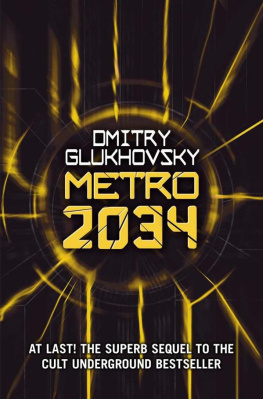Dmitry Adamsky - Russian Nuclear Orthodoxy
Here you can read online Dmitry Adamsky - Russian Nuclear Orthodoxy full text of the book (entire story) in english for free. Download pdf and epub, get meaning, cover and reviews about this ebook. year: 2018, publisher: Stanford University Press, genre: Politics. Description of the work, (preface) as well as reviews are available. Best literature library LitArk.com created for fans of good reading and offers a wide selection of genres:
Romance novel
Science fiction
Adventure
Detective
Science
History
Home and family
Prose
Art
Politics
Computer
Non-fiction
Religion
Business
Children
Humor
Choose a favorite category and find really read worthwhile books. Enjoy immersion in the world of imagination, feel the emotions of the characters or learn something new for yourself, make an fascinating discovery.

- Book:Russian Nuclear Orthodoxy
- Author:
- Publisher:Stanford University Press
- Genre:
- Year:2018
- Rating:4 / 5
- Favourites:Add to favourites
- Your mark:
- 80
- 1
- 2
- 3
- 4
- 5
Russian Nuclear Orthodoxy: summary, description and annotation
We offer to read an annotation, description, summary or preface (depends on what the author of the book "Russian Nuclear Orthodoxy" wrote himself). If you haven't found the necessary information about the book — write in the comments, we will try to find it.
Russian Nuclear Orthodoxy — read online for free the complete book (whole text) full work
Below is the text of the book, divided by pages. System saving the place of the last page read, allows you to conveniently read the book "Russian Nuclear Orthodoxy" online for free, without having to search again every time where you left off. Put a bookmark, and you can go to the page where you finished reading at any time.
Font size:
Interval:
Bookmark:
DMITRY (DIMA) ADAMSKY
RUSSIAN NUCLEAR ORTHODOXY
Religion, Politics, and Strategy
STANFORD UNIVERSITY PRESS
STANFORD, CALIFORNIA
Stanford University Press
Stanford, California
2019 by the Board of Trustees of the Leland Stanford Junior University. All rights reserved.
No part of this book may be reproduced or transmitted in any form or by any means, electronic or mechanical, including photocopying and recording, or in any information storage or retrieval system without the prior written permission of Stanford University Press.
Printed in the United States of America on acid-free, archival-quality paper
Library of Congress Cataloging-in-Publication Data
Names: Adamsky, Dmitry, author.
Title: Russian nuclear orthodoxy : religion, politics, and strategy / Dmitry (Dima) Adamsky.
Description: Stanford, California : Stanford University Press, [2019] | Includes bibliographical references and index.
Identifiers: LCCN 2018041926 (print) | LCCN 2018043465 (ebook) | ISBN 9781503608658 (e-book) | ISBN 9781503608054 (cloth : alk. paper) | ISBN 9781503608641 (pbk. : alk. paper)
Subjects: LCSH: Nuclear weaponsRussia (Federation) | Nuclear weaponsGovernment policyRussia (Federation) | Nuclear warfareReligious aspectsRusskaia pravoslavnaia tserkov. | Church and stateRussia (Federation) | Church and stateRusskaia pravoslavnaia tserkov. | Russkaia pravoslavnaia tserkovPolitical activity. | Russia (Federation)Military policy.
Classification: LCC UA770 (ebook) | LCC UA770 .A573 2019 (print) | DDC 355.02/170947dc23
LC record available at https://lccn.loc.gov/2018041926
Typeset by Westchester Publishing Services in 10.75/15 Adobe Caslon
For my grandmother, who took me as a child to walk and draw in the yard of the Novodevichy Monastery.
CONTENTS
ACKNOWLEDGMENTS
This book was the longest, and one of the most difficult and amazing, projects I have ever done. I had been thinking about it and collecting materials since 2010, but things did not progress. There were various reasons for that, plus writers block. Then, everything changed. The muse, who brought unmatched inspiration, came to me in May 2015. This encounter has enormously empowered me in certain ways and immensely complicated my life in others. That said, I guess I was more fortunate than not and was grateful to the muse.
Uri Bar-Joseph provided me with ideas for all my previous books. This is the first book that I conceived myself. Still, I was fortunate to have him as my teacher and mentor during this project. Coffee sessions on the bench in the yard of the old Jaffa church enabled me to better imagine the book, not to lose faith, and to complete the project.
The books theme was prompted by conversations with Jacqueline Newmyer Deal, Andrew W. Marshall, and Stephen P. Rosen. Their questions made me pay greater attention to what until then looked like just a footnote in my larger work on Russian nuclear strategy. Their interest, encouragement, and advice in the following years enabled me to structure the book.
I am grateful to several Russian, American, European, and Israeli scholars, officials, and clerics who provided counsel and assistance, on the condition of anonymity. My conversations with one of them in particular have been indispensable over the years. He has been very generous with his time, attention, and wisdom. I benefited enormously from his phenomenal knowledge of religious affairs and history. His genuine faith and devoted service has given me a better sense of the Russian Orthodoxy coming from the heart and mind of a true believer.
Nehemia Burgin encouraged me nonstop to move forward, asked difficult questions, and assisted with advice and unique sources. He invested more time in this manuscript than anyone else and provided the most valuable insights. I am very thankful to him.
Numerous conversations and professional fun with Yaacov (Kobi) Falkov, an authority on Russian history and politics, enabled me to better refine my arguments. Daniel Rakov, a wise and modest scholar, was supportive in his unique way with critique and opinion.
MS was indispensable. As with my previous projects, he was puzzled by what I am doing and why anyone would care; he assisted in getting to the most important sources and places and shared his wisdom, kindness, and humor. On our unforgettable trips I learned a great deal, about the subject, life, and myself.
MZ was always there for me. In addition to endless personal and professional support, he has taught me, by example, how to strive against the odds, to remain unbreakable, and to succeed time and again.
I was lucky to have an unparalleled and dedicated research assistant, who asked for anonymity. Her initiative, creativity, and professionalism, with which she met my endless requests, were superb. Most importantly, a great scholar, she was passionate about the subject, asked intriguing questions, and provided outstanding comments.
Through these years, I have been fortunate to count on Morielle Lotan and Leehe Friedman, directors of the Honors Track in Strategy and Decision Making, which I am heading at the Interdisciplinary Center (IDC) Herzliya. They brilliantly carried out their academic-administrative responsibilities, which saved me time and energy for the work on the book.
I have benefited much from the advice, remarks, and questions of Uzi Arad, Yossi Baidatz, Eliot Cohen, Thomas Erhard, Gideon Frank, Amos Gilad, Ori Goldberg, Gershon Hacohen, Ben Lamont, Ariel (Eli) Levite, Keir Lieber, Andrew May, Dan Meridor, Phillip Pournelle, Daryl Press, Yoav Rosenberg, and Keren Yarhi-Milo. Itai Brun generously shared with me the contours of the analytical framework for faith-military relations. I am indebted to Yaacov (Yasha) Kedmi for unique reflections on Vladimir Putin and other senior Russian officials, as well as his ideas and advice on the themes central to the book. I am thankful to Morielle Lotan for her insights on the strategic role of nuclear operators. Felix Motzkin shared his unique experiences with the Soviet political officers and with their Russian reincarnations, for which I am indebted to him.
The School of Government at the IDC Herzliya has been an exceptional professional home. My thanks go to Uriel Reichman, the president; Alex Mintz, the provost; and Boaz Ganor, the dean, who have enabled me to benefit from the IDCs success story and to be part of this remarkable academic institution, the genuine academia of the twenty-first century. I have also been exceptionally fortunate to have kind colleagues at the school. I would like to thank especially Assaf Moghadam and Asif Efrat, who always found time for me and were generous with their wisdom and advice. Also, I have benefited enormously from the questions and observations of the IDC students, particularly those of the Honors Track and of my seminar on Russian foreign and security policy.
Ron Hassner provided priceless theoretical and methodological advice, which significantly improved the final product. David Holloway, on a walk in the woods during the Nuclear Boot Camp in Italy, provided sharp and prudent counsel about what to do and what not to do in the book, and how to proceed. I am very grateful to both. I would also like to extend my thanks to three anonymous reviewers for their insightful comments. Ruvik Danieli did a superb editing job of unparalleled professionalism. It has been a privilege and pleasure to work with Alan Harvey and Leah Pennywark of the Stanford University Press.
I was very close to my grandmother and was lucky to share the books idea with her. I told her that my passion for the subject probably has something to do with early childhood experiences, when as a good Jewish grandmother she took me to walk and draw in one of the most picturesque places of Moscowthe Novodevichy Monastery. She was thrilled to hear it. She passed away halfway through my work. This book is a tribute to everything she did for me and is dedicated to her memory.
Next pageFont size:
Interval:
Bookmark:
Similar books «Russian Nuclear Orthodoxy»
Look at similar books to Russian Nuclear Orthodoxy. We have selected literature similar in name and meaning in the hope of providing readers with more options to find new, interesting, not yet read works.
Discussion, reviews of the book Russian Nuclear Orthodoxy and just readers' own opinions. Leave your comments, write what you think about the work, its meaning or the main characters. Specify what exactly you liked and what you didn't like, and why you think so.

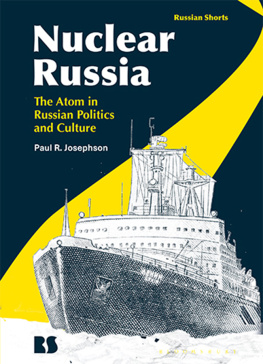
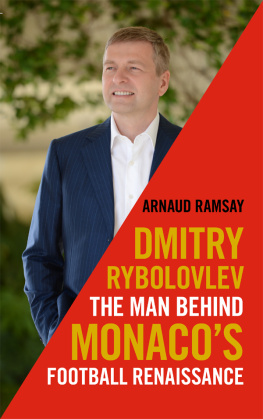
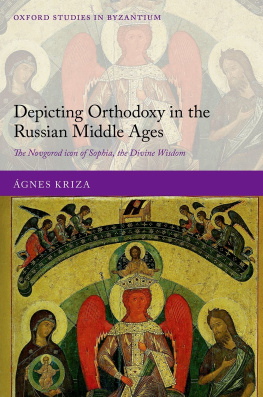
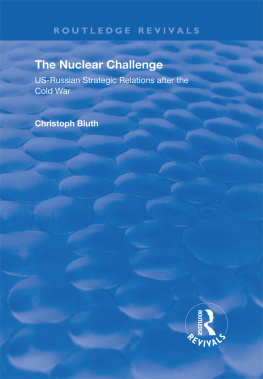
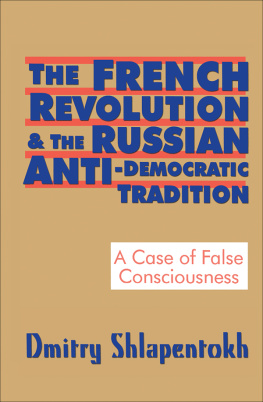
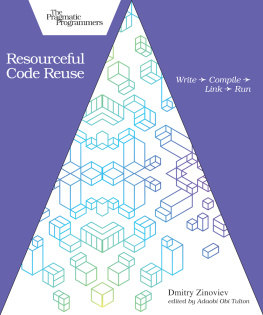
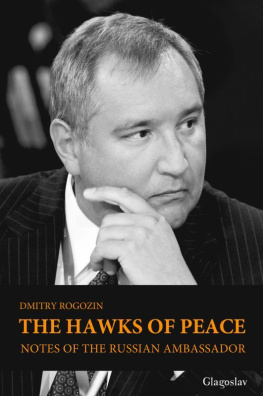

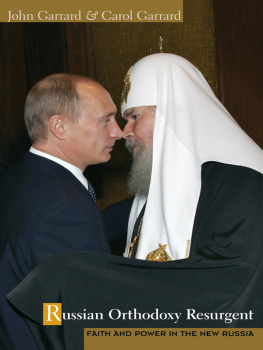
![Dmitry Zinoviev [Dmitry Zinoviev] - Data Science Essentials in Python](/uploads/posts/book/119602/thumbs/dmitry-zinoviev-dmitry-zinoviev-data-science.jpg)
